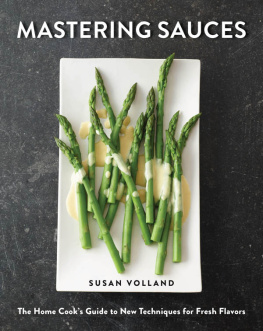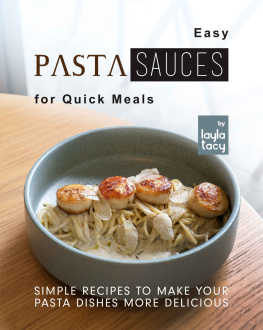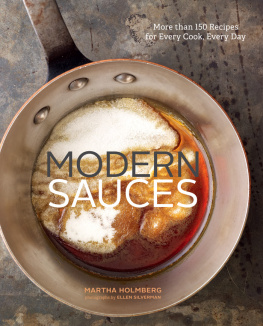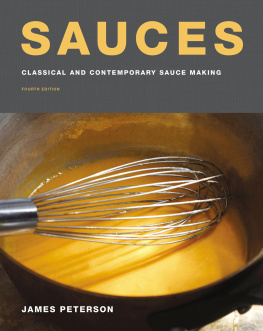

For Jeff. Thank you for showing me how wonderful life is when you flavor, texturize, and season it with good friends and family.
CONTENTS
Please bookmark your page before following any links.
MASTERING SAUCES
S auces make foods taste right. Order a piece of chicken or some noodles anywhere in the world, and youre going to get pretty much the same thing. Unembellished ingredients tend to have a global uniformity. Add sauce, and everything changes. Dishes become regional and familial. Turkey gravy is meant to taste like Grandmas. Football gatherings arent the same without Daves game day enchiladas. Summer doesnt officially start until Evelyns famous macaroni salad appears. Even people who may proclaim ambivalence to sauces will customize their sandwiches with light mayo or extra-strong mustard. Lovers of plain steak still choose their favorite salad dressings and baked potato toppings. Sauce is personal. Its everywhere. And its not always fancy.
Mastering Sauces is about confidence, control, and customization. Its a reminder that the right way to make sauce is your way. For todays cooks that often means sauces that feature fresh, seasonal produce, international ingredients, and variations for alternative diets and food sensitivities. The first hurdle is to step away from the temptations of jars and packets. Sauces may be uniformly accepted as tasty, but unfortunately, sauce making is often perceived as being a special skill.
I make sauces like a chef. That means I usually make my sauces spontaneously, with drizzles of this, pinches of that, and lots of pan rattling. I have fun with it. When I suggest to other people that they should make their sauces with similar vim, they either nod enthusiastically in agreement or look at me like Ive asked them to sprout wings and fly. There isnt a lot of middle ground.
Curious cooks who venture into the world of traditional sauce making often find themselves barraged with French terms, obsessing over cauldrons of simmering bones and subtle color gradations of toasted flour, and awash in seemingly endless quantities of eggs, cream, and butter. Sauce making, like baking or preserving, is often presented as a culinary canon. It is presumed that if you want to get good at it, you need to take it very seriously and start with the classics. Thats partially true. Having a solid culinary foundation is what gives me the freedom to make sauces with confidence. But to casual cooks looking for dinner ideas, the old lessons can seem practically prehistoric. Modern cooks want teriyaki and tikka masala, not jugged hare. Tastes have changed. Unfortunately, the lesson plans havent quite kept up with the times.
Mastering Sauces is meant to be as liberating and lighthearted as sauces themselves. My goal is to get more people to cook. Cooking brings people together. Its creative. No matter how many sets of matching pigments and paintbrushes you distribute, no two people will create the same work of art. Sauces are the samethey just adorn a different kind of blank canvas. I believe that laughing and finger painting with friends is as important as visits to the Louvre. I will forever appreciate the liberty that came with my classical education, but I believe the best way to get more people to cook sauces is to remove a layer of formality and freshen things up. The best sauces are those that fit your lifestyle, not the other way around.
Several years ago, my nephew, Greg, set out to find the perfect combination of warm breadsticks and marinara dipping sauce. He was a ridiculously picky eater. Suddenly, though, instead of just shaking his head and refusing to taste whatever was set before him, he started actively looking for good food experiences. His quest took him to new places. He smelled and saw new things. He compared restaurant A with restaurant B and weighed their merits. We even spent time together making our own breadsticks and sauce from scratch. (Both were judged just okay.) Best of all, he consciously tasted his food and thought about what he was eating.
Sauces are a part of our daily lives. Sometimes they are best delicately ladled from heirloom china; other times its all about dipping warm, chewy breadsticks into a marinara that has just the right balance of garlic, oregano, and tomato flavor. If it can be enjoyed while blasting aliens, all the better.
When it comes to cooking, I have strong ties to both the old and the new. I learned my craft from formal women wearing starched caps at the London Cordon Bleu Cookery School. My fellow students were from all over the world and young by decree. We felt a bit ridiculous having to address our peers formally as Mr. this and Miss that. For the first three months, we were not allowed to use any equipment that was plugged in other than the stovetop and oven. In the mornings, we all cooked the same small portions of classic recipes on home-style equipment: omelets with tiny, buttery croutons; timbales of creamy fish mousse; trembling sherry-laced jellies. Each dish was tasted and individually critiqued. In the afternoons, we crowded into a stuffy room for demonstrations and to collectively recite the basic quantities of common recipes by rote. The thought of our formal quarterly exams still makes me shudder with anxiety. Three school directors would loom over your work space with their spoons, picking through your dishes and scribbling notes on their clipboards. You were required to keep all of your trash in a small bin, and after your food was judged, the high priestesses would tip it out to see whether you had peeled your potatoes wastefully or used too many paper towels. Eggshells were to be reserved, because they could be used to help clarify tomorrows batch of consomm. (That is a technique I have purposely omitted from this book because I never, ever want to do it again.) I hated it, but I now understand how influential that kind of intimacy was. I learned to cook for individuals, not crowds. Thats still what I feel most comfortable doing.
When I returned home to Seattle, I had no clue about cooking in a restaurant. Unlike American culinary school graduates, I had never prepared large quantities of food or used professional equipment. But I managed to fake familiarity with steam kettles and huge tilting skillets. I could cook, and thats what really mattered. I catered, baked, and worked in fine-dining restaurants. I saw firsthand why chefs make such great reality TV. When you combine crazy work ethics, perfectionism, heat, noise, knives, artistry, crisis management, and a slightly odd predilection for performance and public service, you have yourself a chef. Cram a team of them into a small high-pressure environment, and you have a rocking restaurant hot line. When it all syncs together, its a rush unlike any other. The short bursts of unmatched teamwork, pride, and sensory overload manage to offset the long hours, lack of social life, and lousy paychecksat least for a while. It didnt take long before the hours, the egos, and the impersonality of it all got to me. I didnt want to cook for strangers, so I veered off into food communication and enjoyed spending dinnertime with friends and family again.
I taught, I made pretty food for photographs and TV, I created original recipes for corporations. An editor offered to pay me to write an article, so I started writing. I traveled, read a lot, and experimented with exotic ingredients and techniques. Twenty-five years after graduating from the Cordon Bleu, I found myself worlds away from that tiny old-fashioned school and part of the Modernist Cuisine team.
Next page






